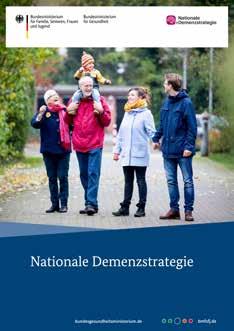
5 minute read
Germany launches its new National Dementia Strategy
On 1 July, the German Federal Government announced the launch of the first National Dementia Strategy for Germany. Alzheimer Europe spoke with Franziska Giffey, German Federal Minister for Family Affairs, Senior Citizens, Women and Youth, to find out more about the strategy, as well as with Sabine Jansen, Executive Director of Deutsche Alzheimer Gesellschaft, to hear her reflections.
Advertisement
Can you give us an insight into some of the focus areas of the strategy?
There are about 1.6 million people with dementia living in Germany. By 2050, the number could rise to about 2.8 million. Our aim is that people with dementia are well cared for and remain an active part of our society for as long as possible.
Three of the goals in our strategy are particularly important to me. First of all, we need solidarity and support at the local level. We aim to achieve this by building local networks. Secondly, we need to look at the families of people with dementia. When a loved one develops dementia, professionals must be at hand to advise and support on medical and social issues. For this purpose, we are going to improve the coordination between medical and social care structures. Thirdly, I am working to ensure that we bring about a major shift in social awareness. It was therefore very important to me to start implementing the strategy in cooperation with many different partners. Germany is on its way. But we still have a lot to do in order to actually become a dementia-friendly country.
Does the strategy have a dedicated budget to support the implementation of its objectives?
In the years to come, our society will have to raise billions of euros in order to adapt Germany to the needs of an ageing society and of an increasing number of people with dementia. This is true when planning both at local and at national level and, of course, in the social insurance system, for example when it comes to prevention and care. But also for cultural institutions, religious communities or local sports clubs. The aim of the National Dementia Strategy (Nationale Demenzstrategie) is to do this in a coordinated and focused manner. Networks are central to this. In the next few years, the Federal Ministry for Senior Citizens will fund measures worth two million euros annually in order to create these networks. However, the strategy can only work when all partners make their contribution.
How will the Federal Government be monitoring the implementation of the strategy and how will its impact be measured?
The strategy follows a very targeted approach. It includes a set of about 160 specific measures as well as dates for their implementation. All of these measures will be monitored. In 2026, we will take stock and revise the strategy. But now we are only at the start. We have big plans and a lot to do.
How will you work with Deutsche Alzheimer Gesellschaft (German Alzheimer’s Society) and people with dementia to ensure their voices are heard?
The German Alzheimer’s Society co-chaired the development of the strategy. We, the Federal Government, have been working closely with the Alzheimer’s Society. This partnership is very important to me and, of course, we will continue to work closely together. Achieving the goal of adjusting all areas of life to the needs of an ageing society and of more people with dementia is only possible in a well working team. We are funding the helpline “Alzheimer-Telefon” – an important service in Germany provided by the Alzheimer’s Society. We also cooperate with the German Alzheimer’s Society and various partners in joint projects, for example with the German Olympic Sports Confederation (Deutscher Olympischer Sportbund). All of these cooperations help us to reach people in all areas of life.

In your opinion, what is the most important factor in the success of the strategy?
It is this team spirit that will make the National Dementia Strategy a success. In addition to the Federal Government and the German Alzheimer’s Society, the federal states and municipalities, nursing and health care associations, science and civil society have been involved in the drafting.
Sabine Jansen, Executive Director of Deutsche Alzheimer Gesellschaft , responds to launch of the new National Dementia Strategy

What has been the key driver for the development of the strategy?
In Germany, we have 1.6 million people living with dementia, with this number set to increase in the coming years. In addition to this, we have a lack of professional carers. These are enormous challenges which need a strategy to address them.
What are some of the measures you see as being particularly important in the strategy?
All measures that focus on education of diff erent groups of people, such as public transport workers, the young generation, neighbours etc. are important to create a more dementia-inclusive society. Furthermore, improvements to the medical and care sectors are extremely important.
Does the strategy have a dedicated budget to implement its objectives/ commitments?
The strategy itself unfortunately has no budget, however, the ministries that are For the implementation of the strategy many more partners have come together: the rail operator Deutsche Bahn, the German Olympic Sports Confederation (Deutscher Olympischer Sportbund), Martina Voss-Tecklenburg, the coach of Germany’s women’s national football team, in her capacity as dementia ambassador, the German Cultural Council (Deutscher Kulturrat), the two large churches (Protestant and Catholic), involved in the strategy have a budget for some of the measures this and next year.
We do not know what the budget will be over the coming years. We fear that the consequences of the COVID-19 pandemic might aff ect the budget for dementia.
How did the Federal Government commit to continuing to work with DAlzG to ensure that the voices of people with dementia are heard during the strategy’s implementation?
DAlzG is member of the steering committee of the strategy which will meet regularly to monitor its implementation. In addition, we regularly discuss the progress with our advisory board of people with dementia.
What do you see as being the most important factor in the success of the strategy?
The monitoring system is important to control the progress of the implementation. The engagement of all actors and of course the money that will be invested, will be very helpful in bringing success. supermarket chains such as NETTO and many more. If we manage to make society as a whole realise that we all need to be more aware of the topic, then the implementation of the strategy will work out well. I am sure, it will be a success.
Full details about the German National Dementia Strategy can be found at: https://www.nationale-demenzstrategie.de











